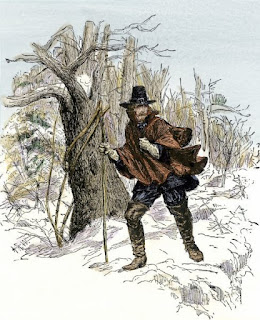October 9th Devotional
Colossians 1:18
On this day in 1635, Pastor Roger Williams was banished from the Massachusetts Colony because of his ‘extreme Christian’ and separatist views. The late 1500s and early 1600s were politically charged times in the colonies. The Protestant Reformation was only slightly over 100 years earlier and England’s break from Catholicism even less time. Christianity was in a moment of major flux. While the Church of England proudly boasted its freedom from the Roman Catholic Church it still had many vestiges of Catholicism. A group of people called the Separatists, better known as Puritans, felt a need to purify the church from what they called the rags of popery. This particular group stood against the existence of a state-run church and felt that a church should have no authority over it except for the Bible and God. This early group of Separatists were punished heavily for their opposition. They would be jailed for failure to attend state-run church services, have their possessions removed, and some of them severely beaten. One such Separatist was named Roger Williams. Williams was born in the early 1600s. The persecution against those that were Puritans in England was harsh. Many were beaten and some were even burned at the stake. Williams fled to Massachusetts to find religious freedom. He arrived in 1630, a mere ten years after the landing of the Mayflower. Within those ten years, the Church of England dug its heel into the young colony and began to punish anyone who stood against the state church. They claimed that the church’s independence was a doctrine of Satan. Williams started to pastor in Boston but had to flee because of his views on the autonomy of the local church, along with his sympathy for the Native Americans. He would then travel to Salem to pastor. The congregation as a whole loved him but the magistrates did not. They forced him to leave the colony under the penalty of death. He left in the bitter winter. He traversed 55 miles through the frigid and unforgiving terrain during a blizzard. A group of Native Americans gave him aid and he legally purchased land from them. It was on this site that Providence Rhode Island would be formed. This land became a place for everyone fleeing religious persecution and seeking religious freedom. This site would also be where the first established Baptist Church in America was formed.
Williams's view 400 years ago
was considered heretical. It was extremely
dangerous to question the state’s authority over the local church. But, if the state isn’t the authority of the church,
then who or what is? The Bible doesn’t
hesitate to tell us who is the authority of the local church. Paul writes in Colossians 1:18, “He is also
head of the body, the church; and He is the beginning, the firstborn from the
dead so that He Himself will come to have first place in everything.” Paul uses the metaphor of the head to describe
Christ’s position in the local church.
The head, or brain, controls the rest of the body. What the brain does, the body responds in
obedience. If the body does not respond
to the brain's requests then there is a serious medical issue. Christ is the head of the church which means He
is the leader of the church. He controls
every part of the church. He provides it
with life and direction. Most of you
reading this wouldn’t argue with the theological truth of Christ’s headship
over the church. The issue isn’t
doctrinal, it’s application. Does Christ
have absolute authority in our local church? Do we allow Him to lead and guide the church? Does our church look more like a New
Testament Church or a business model/pyramid scheme? How do we place Christ as the head of the local
Church? It isn’t something a pastor or a
counsel does, it’s something that individual believers do. A church cannot have Christ in His preeminent
position as leader unless He is first leader of each of our lives. He must be the Lord of our hearts and homes before
He is the Lord of our churches. Honestly, do you allow Christ to lead your
life and the life of your local church?

No comments:
Post a Comment